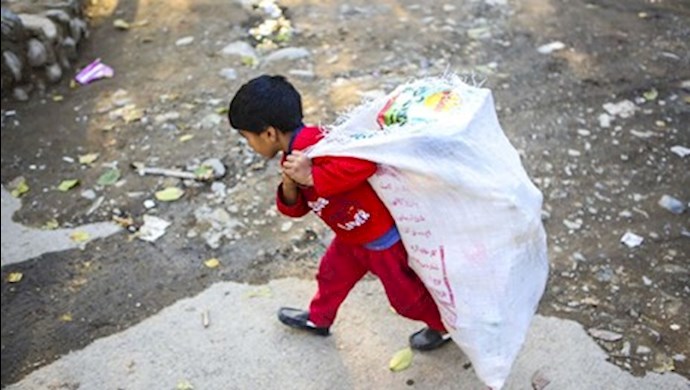Analysis by PMOI/MEK
Iran, April 18, 2021—While Iran is one of the richest countries in the world, its people suffer from extreme poverty. The officials of the mullahs’ regime blame sanctions for Iran’s economic problems. But the reality is that their incompetence and inefficiency are the main cause of the problem. They use the harsh economic problems in Iran as a leverage to call for the lifting of sanctions while regime-backed institutions continue to loot Iran’s wealth and resources and spend them on nefarious goals.
Various regime experts acknowledged in recent days that poverty or the decline in people’s purchasing power is rooted in the structure of Iran's political economy and is not necessarily related to sanctions.
In remarks to the state-run Fars News Agency on April 13, Meysam Moussai, a university professor and economist said that the government is wittingly producing poverty.
“As inflation increases and people's purchasing power decreases, first the unnecessary goods are removed from families’ consumption basket and then it is the turn of the basic goods,” Moussai said.
While warning against the elimination of Iran’s middle class and the increasing inflation, Moussai said: “When the middle class drops below 50 percent and is eliminated, the society loses its balance and this issue causes more unemployment, inflation, and other accidents.”
He stated that the poverty line in Tehran has been announced at 90 million rials while workers' salaries are lower than 25 million rials.
On April 12, the state-run Aftab News wrote in this regard, “Inflation and skyrocketing prices are the reality of workers’ life, and workers' wages fades and has become ineffective. By strengthening the causes of inflation, governments have turned wages into a neutral category, but they are well aware that their play with the wage rate and the depletion of its real rate by inflation is merely to moderate the workers' protest potential.”
The economy’s negative course has reduced per-capita income and the increase of poverty. Aside from the issue of wage devaluation, the continuation of negative growth rates has trapped the country's economy in poverty.
The regime tries to blame sanctions, but the reality is that even before the withdrawal of the United States from the Nuclear deal in May 2018 and the “maximum pressure” policy, Iranian people suffered from poverty.
On December 28, 2017, protests erupted following the rise of the egg price and inflation and continued until January 6, 2018. It turned swiftly into a wave of anti-government protests targeting the whole theocracy ruling Iran.
According to research in 2017, the number of garbage collectors in Tehran is 14,000 people, of which 4,700 are children. Forty percent of these children are completely illiterate, 37 percent have left school, and work an average of ten-and-half hours a day.
While the regime received tons of money through oil sales, according to Ebrahim Razaghi, a regime’s economist, in 2017, Iran had 15 million unemployed people. Also, the former deputy of the regime’s Health Ministry Ali Akbar Sayari said, “In 2017, more than 30 percent of the Iranian population was starving and had nothing to eat.” Of Iran's 65 million urban population, one-third are live in slums on the fringes of large cities.
Corruption, like cancer, has pervaded Iran’s society. The extent of the corruption is astronomical and unimaginable. At the top of this corruption pyramid, is the regime’s supreme leader Ali Khamenei, who has $95 billion in assets.
In 2015, Iran was ranked first among 152 countries in the world money laundering index. The state-run daily Mardom Salari acknowledged in 2017 that trafficking is an institutional issue in the country, with more than 70 percent of smuggling issues stemming from the formal processes of the country's economy.
The regime also spends billions of dollars for its terrorist activities in the region. On May 21, 2020, Etemad Online, a state-run news website, quoted Heshmatollah Falahatpisheh, a former MP from Kermanshah and member of the Majlis Security Commission, as saying: “We may have given $20-30 billion to Syria.”
“When I went to Syria, some complained that I had caused expenses, but I will say this again: We may have given $20-30 billion to Syria. The money of these people was spent there,” Falahatpisheh said.
When Falahatpisheh was the chairman of the Security Commission, he led a parliamentary delegation to Syria, where he met with Emad Khamis, the Prime Minister of the Assad regime.
“In the budget, oil revenue equals to a fourth of the share of taxes. This means that in reality, it is the people who are paying for the country’s expenses. And this is a country that is sitting on a sea of oil,” Falahatpisheh said. “If we consider all of this, it means that we have the necessary budget to solve the country’s economic problems, that is if the budget is not spent on other things.”
In the previous year, the mullahs’ priorities were not the Iranian people’s welfare but funding and arming terrorist groups, investing in internal repression, and acquiring nuclear weapons to ensure their own survival. Because of these policies, today, 80 percent of the Iranian people are living below the poverty line. Therefore, as long as the mullahs are in power, the lifting of sanctions will not resolve any of Iran’s problems.





